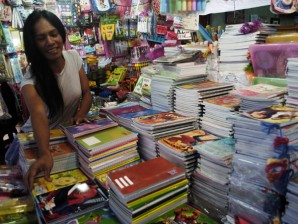MANILA, Philippines—The Department of Trade and Industry (DTI) has intensified its monitoring of the prices, availability and quality of school supplies in public markets, where most parents go for bargains, ahead of the opening of classes next month.
In a statement, the DTI explained that it customarily heightened its market monitoring operations to ensure an adequate supply and stable prices of school supplies whose sales usually peak in May.
According to the DTI , it is working closely with other government agencies such as the Department of Health’s Food and Drug Administration, Department of Education and local government units to keep a tight watch on distributors and retailers of school supplies to prevent unreasonable price hikes and the proliferation of unsafe school items.
A list of suggested retail prices (SRPs) of selected school supplies has been published to guide retailers and consumers.
Based on the May 5 SRP guide and depending on the brand and type, composition notebooks with 80 leaves should be priced between P10 and P15.75 while prices of writing notebooks with 80 leaves should range from P10.75 to P15.75.
Aside from prices, the DTI also checks the quality and labels of school supplies.
Under Republic Act No. 7394, or the Consumer Act of the Philippines, manufacturers and distributors must comply with the minimum labeling requirements which include the name and address of the manufacturer, trade or brand name, type or size of product, country of manufacture, quantity, toxicity warning and instructions for use.
Other markings that school supplies should bear include the class of paper (econobond, book, bond), number of leaves for notebooks and school pads, hardness symbol for lead pencils, the word “nontoxic” on crayons, and tip classification for ball pens.
Meanwhile, the FDA is keeping watch to ensure that harmful chemicals that may be found in school supplies are within tolerable levels. Otherwise, it could issue a “seize and desist order” and confiscate the goods.
